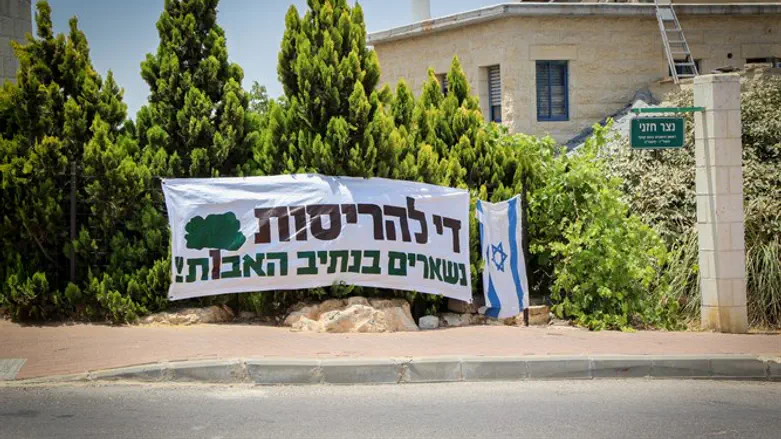
Prime Minister Binyamin Netanyahu and Finance Minister Moshe Kahlon agreed today on the budget for the Netiv Ha'avot alternate housing plan.
The Supreme Court in December 2016 ordered the destruction of 15 houses in Elazar's Netiv Ha'avot neighborhood, after a disputed strip of land was found to run through them. The remaining homes in the neighborhood are entirely on state land.
Cabinet Secretary Tzachi Braverman was instructed to prepare a draft resolution on the matter, which will be brought up for a cabinet decision on Sunday.
Prime Minister Netanyahu's chief of staff Yoav Horowitz informed Netiv Ha'avot residents that the 15 homes would soon be demolished in accordance with the Supreme Court ruling.
The Haaretz newspaper reported this week that the residents of the neighborhood whose homes will be demolished, will be compensated with the sum of NIS 20 million and will be transferred to temporary caravan homes on a nearby plot of land.
Last night, the State Attorney's Office submitted an urgent request to the Supreme Court to postpone the execution of the house demolition ruling in the neighborhood until July 15.
The State submitted the request after residents signed a commitment to allow the eviction to be executed peacefully, without violence and without barricading themselves in their homes.
The postponement is intended, among other things, to allow an arrangement where seven of the houses slated for demolition remain in place and only the parts built on the disputed strip of land are demolished.
In addition, the postponement is supposed to enable completion of the temporary caravan site to be used by Netiv Ha'avot residents, which has already been approved by the Supreme Planning Council.
The request filed by the State Attorney's Office stated, among other things, that this was a proportionate extension of the time allotted by the Supreme Court for execution of the judgment, and that it is in the state's interest is carry out the eviction peacefully.
Land in Judea and Samaria was once classified as state land, private property or of undefined status. Several years ago, the Supreme Court decided that land of undefined status is to be considered private Arab land.